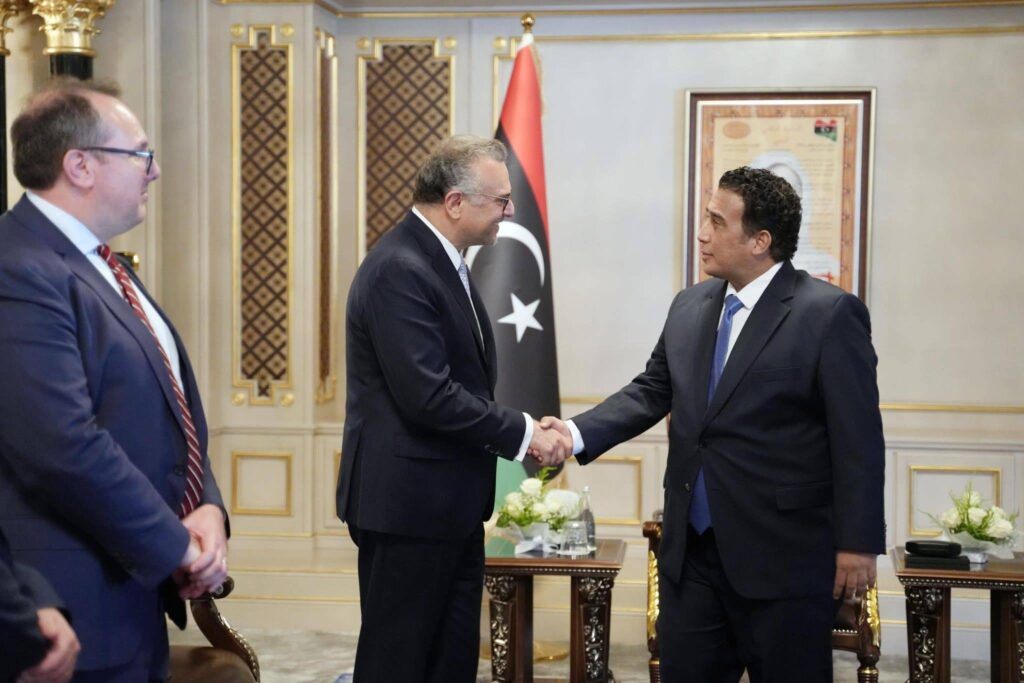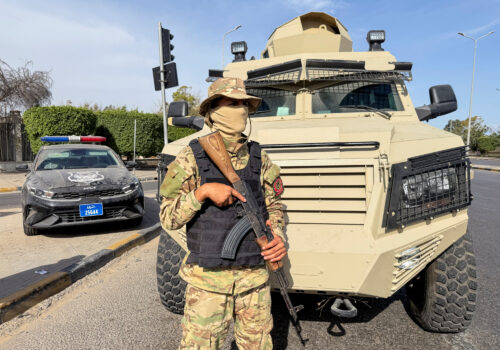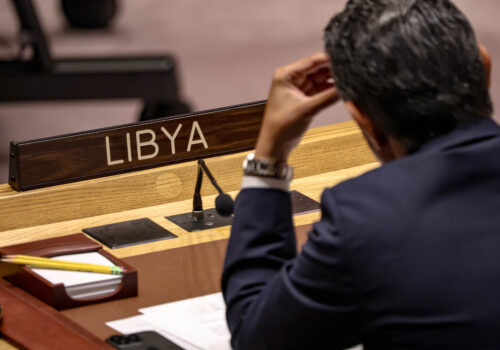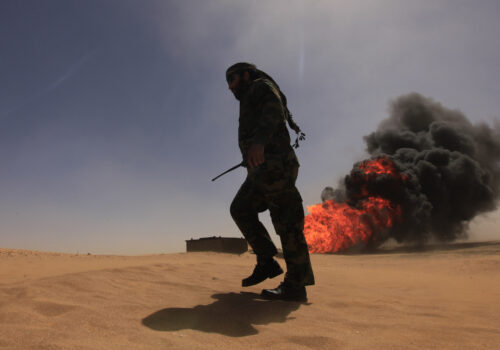Turkey and Italy’s long-standing influence as external players in western Libya and backers of the Tripoli-based Government of National Unity (GNU) was reinforced this August‚—when Turkey’s President Recep Erdoğan and Italy’s Prime Minister Giorgia Meloni together welcomed Libya’s Prime Minister Abdulhamid Dbeibah in Istanbul.
The more notable development over the summer, however, centers on how both Rome and Ankara are shifting towards a model of engagement in Libya similar to that of the United States.
Despite the trilateral meeting between Meloni, Erdoğan, and Dbeibah, Italy and Turkey also engaged with eastern powerbrokers this summer. In June, Rome signaled its willingness to deal directly with the Haftar family’s opposition when Interior Minister Matteo Piantedosi sat down with Saddam Haftar, the son of Libyan National Army (LNA) commander Khalifa Haftar. In August, Turkey sent its intelligence chief Ibrahim Kalin to Benghazi for talks with Khalifa Haftar and senior LNA officials.
This increased emphasis on balanced outreach across Libya’s divide appears to be in coordination with the United States, which has also been active on the Libya file in recent months, steered by US Senior Advisor Massad Boulos. This was also on display over the summer, with Boulos’ July visit to Tripoli and Benghazi, where he met with Dbeibah and other GNU officials, as well as eastern powerbrokers, including Khalifa Haftar and his sons.
With this new convergence in strategy on Libya, Washington, Ankara, and Rome can—through sustained diplomacy with eastern and western factions—reinforce the economic opportunities presented by institutional unification and reform in Libya.
SIGN UP FOR THIS WEEK IN THE MIDEAST NEWSLETTER
Why Libya still matters
Libya is central to European interests and remains relevant to US priorities. It has the largest proven oil reserves in Africa, but it is also a source of instability in the southern Mediterranean and a key transit point on the irregular migration route to Europe. Since 2014, Libya has been divided between east and west with multiple stalled political transitions while remaining under the influence of armed groups, political elites, and external backers.
Washington has, in recent years, focused its Libyan policy on building stability, with a focus on encouraging steps toward security integration and preserving the independent and technocratic nature of key sovereign institutions like the National Oil Corporation and the Central Bank of Libya.
Spearheaded by Boulos, the United States has recently increased its emphasis on commercial engagement, prioritizing support to US businesses looking to enter the lucrative Libyan market.
Rome’s calculus looks different. Italian politics are dominated by migration pressures, and Libya remains the focus of the central Mediterranean route. At the same time, natural gas imports and energy projects are viewed in Rome as essential for Italy’s long-term economic security.
Ankara views Libya as both an economic and geopolitical stage. Its military presence and commercial contracts give it leverage, while recent outreach to eastern leaders suggests that Turkey wants to exert influence on both sides of the country’s divide.
Balanced engagement model
By September of this year, it was apparent that all three of these influential external actors were aligning on what had been the United States’ approach of balanced engagement across Libya’s divide. This strategy seems practical, given that no political or economic settlement in Libya is credible without eastern powerbrokers at the table.
Boulos’ meeting with the Turkish Foreign Minister Hakan Fidan in August included discussions on engagements in Libya and “joint efforts to deepen cooperation.” The US official’s visit to Rome in September further demonstrated this alignment of Turkish, US, and Italian strategies. Italy’s Foreign Minister, Antonio Tajani, hosted Boulos on September 3 for talks on stability and migration management, while also inviting him to the consequential Mediterranean or “MED” Dialogues, scheduled for October in Naples.
A week later, Washington confirmed that Boulos’ visit also facilitated meetings between senior officials from western and eastern Libya, where they were encouraged “to overcome divisions, to unify institutions, and to promote stability and peace.” Reportedly, these officials included Ibrahim Dbeibah, the nephew and influential advisor to Dbeibah, and Saddam Haftar, deputy commander of the LNA. On September 12, Fidan and Tajani announced in Rome that Turkey and Italy had signed a cooperation agreement and would increase collaboration on promoting a stable and prosperous Libya conducive to investment.
In addition to emphasizing balance, Turkey, Italy, and the United States are increasingly linking commerce with security in their dealings with Libyan counterparts. Energy projects, infrastructure initiatives, and trade opportunities are now frequently linked to security cooperation and migration management. The logic appears to be that commercial activity can expand as progress is made on stabilizing the security sector and consolidating key government institutions. Although each country emphasizes different priorities, together they are converging on a framework that views economic engagement and institutional unification as mutually reinforcing steps toward stability in Libya.
The most interesting development of the summer has been the alignment of American, Italian, and Turkish strategy towards Libya around a balanced engagement model that the United States has been deploying in recent years.
The challenge now is to ensure that this convergence addresses Libya’s deeper problems. Widespread corruption and abuses by armed groups on both sides remain unchecked. If these issues are ignored, greater international activity in commerce and the security sector may reinforce dysfunction rather than resolve it.
What is clear is that despite Libya remaining relatively low on the priority list in Washington, US influence on Libyan policy remains real and visible. Most recently demonstrated by two very influential external actors adjusting their approach to Libya to align with Washington’s balanced model. In a fragmented and multipolar landscape, Libya offers a reminder that US diplomacy can still shape outcomes in meaningful ways.
Frank Talbot is a nonresident senior fellow with the North Africa Initiative at the Atlantic Council’s Rafid Hariri Center & Middle East programs. Previously, he served in the Department of State supporting stabilization initiatives in the Middle East and North Africa.
Karim Mezran is the director of the North Africa Initiative and a resident senior fellow with the Rafik Hariri Center and Middle East Programs at the Atlantic Council, focusing on the processes of change in North Africa.
Further reading
Fri, May 16, 2025
The killing of Abdul Ghani al-Kikli may be a turning point for Libya
MENASource By
The killing is considered to be part of a push to eliminate influential militia leaders and consolidate GNU loyalist control over Tripoli.
Thu, Sep 18, 2025
Libya’s stalled transition: When domestic spoilers meet foreign interests
MENASource By
Libya’s stalled transition has not happened by chance; it has been deliberately engineered into paralysis by both domestic spoilers and foreign powers.
Wed, Apr 2, 2025
Libya’s political deadlock endures. There is a case for Trump and Meloni to challenge the status quo.
MENASource By
The political crisis in Libya is one that the US and Italy may be uniquely postured, and incentivized, to quell.
Image: President of the Libyan Presidential Council, Mohamed Menfi, receives US Presidential Advisor for Africa and the Middle East, Massad Boulos President of the Libyan Presidential Council, Mohamed Menfi, receives US Presidential Advisor for Africa and the Middle East, Massad Boulos, in Tripoli, Libya, on July 23, 2025. Photo by Libya Presidency Office apaimages libya libya libya 2230725_Libya_LPO_002 Copyright: xapaimagesxlibyaxPresidencyxOfficexxapaimagesxNo Use Switzerland. No Use Germany. No Use Japan. No Use Austria



